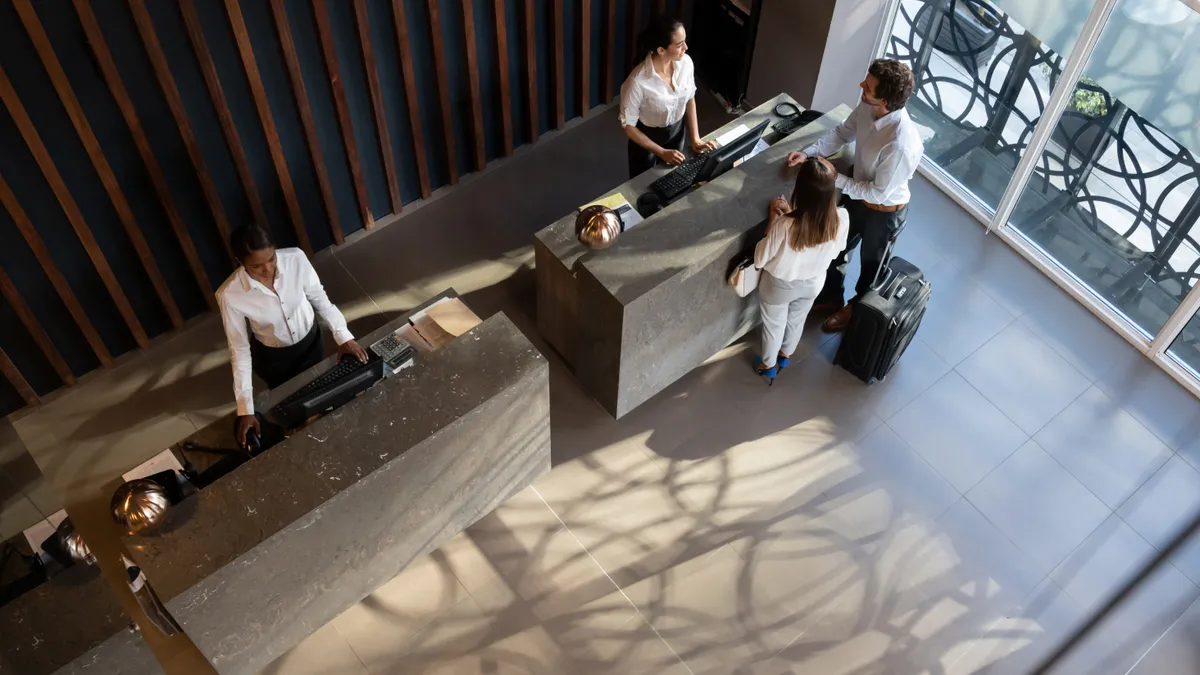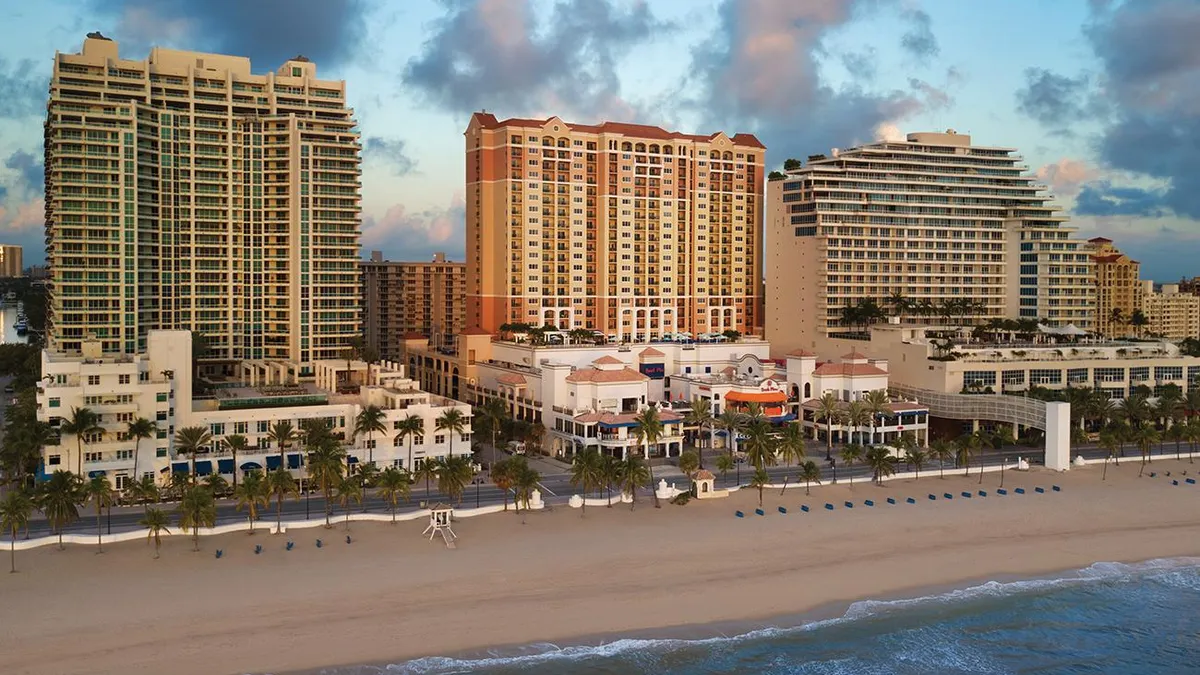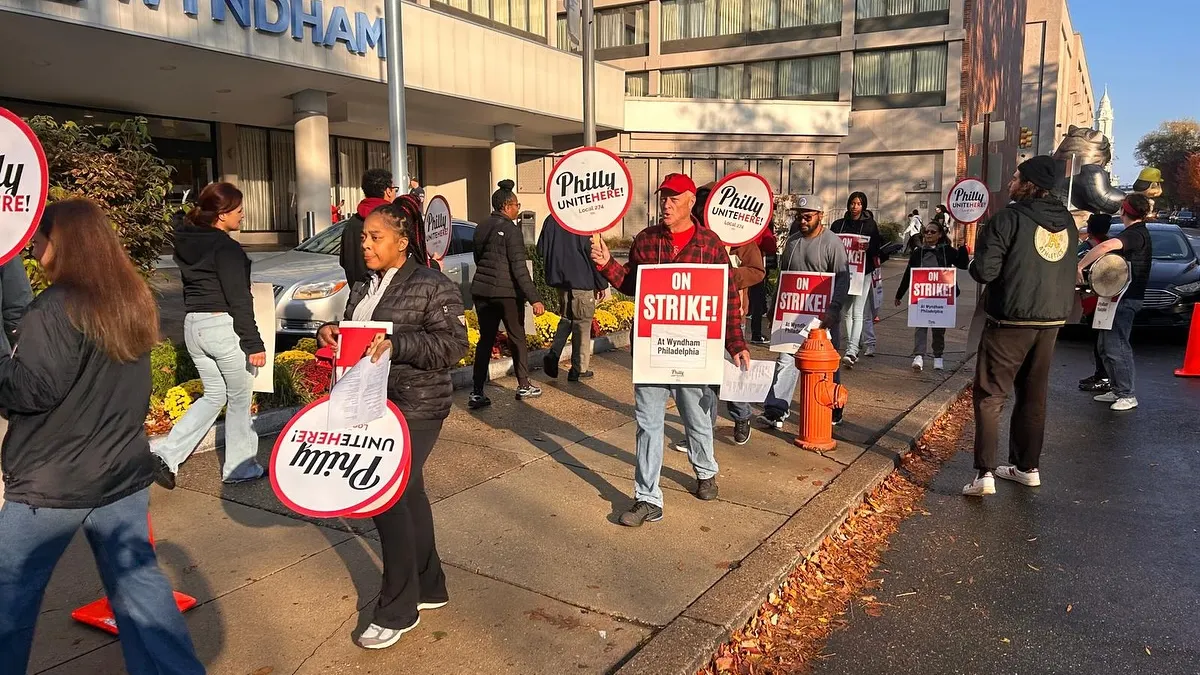On Tuesday, New Yorkers will cast their ballots to elect a new mayor. The results stand to impact the local hotel and tourism industries.
A mayor’s decisions on issues including affordability, crime, safety, transportation and workplace regulations “all have a significant impact on how hotels can best serve their guests, employees, and local community,” Rosanna Maietta, president and CEO of the American Hotel & Lodging Association, told Hotel Dive. In New York — where hotels are “the city’s backbone,” Maietta said — a new mayor would undoubtedly affect every level of the hospitality industry.
On the ticket to replace New York City Mayor Eric Adams are Zohran Mamdani, Andrew Cuomo and Curtis Sliwa. Each candidate has a different stance on how the city should be run. Hotel Dive took a closer look at their campaign platforms to gauge what changes could be coming for the city’s hotels following the election.
Increased minimum wage
One topic that will be top of mind for New York City hotel owners and workers in the coming year is wages.
The New York Hotel and Gaming Trades Council’s union contract with the Hotel Association of New York City is set to expire in July 2026, at which time the parties will head to the bargaining table to craft a new contract.
At the top of the union’s list of demands will be “higher wages and the money we need to secure our medical and pension benefits,” HTC President Rich Maroko said in an April letter to his constituents. The monetary increases are needed to “improve the lives of hotel and gaming workers” in New York City amid a rising cost of living, according to the letter.
This past summer, the union endorsed Democratic mayoral candidate Mamdani, with Maroko saying Mamdani’s “message of improving affordability and quality of life for working New Yorkers is the guiding vision behind everything our union does and supports,” in a statement posted to X in June.
Mamdani is running on a promise to raise New York City’s minimum wage to $30 per hour by 2030. “When incomes don’t match the true cost of living, government services have to make up the difference,” his campaign website reads.
Independent mayoral candidate Cuomo has also proposed expanding the city’s minimum wage, to $20 per hour, by 2027. HTC previously endorsed Cuomo in April. The union could not be reached by Hotel Dive for comment.
In July, Los Angeles passed a $30 minimum wage that hotel industry associations, including AHLA and the Asian American Hotel Owners Association, denounced. AAHOA Chairman Kamalesh Patel said the wage ordinance is “a major setback for Los Angeles’ small business hotel owners.” Rising costs, including labor, were among the highest concerns expressed by hotel industry professionals at this year’s Lodging Conference.
AHLA’s Maietta told Hotel Dive it’s important for New York City to have “a mayor that understands that when a city has a strong relationship with the business community, employers and employees alike will prosper and the city’s economy will grow.”
Economic recovery and growth
A public-private partnership between a city’s mayor and the business community “is critical to the economic strength of the city and its residents,” Maietta added, saying that hotels are a significant contributor to local economies, “generating billions in tax revenue that help fund schools, roads, and public safety.”
New York, specifically, “needs a mayor that appreciates and supports the growth and contributions of hotels and [the] tourism industry and ensures the industry is poised to grow and accelerate in the coming years,” she said.
AHLA and other hotel industry associations have clashed with the New York City government in the past, including on the Safe Hotels Act, which Mayor Eric Adams signed into law last November. When the bill passed in October 2024, AHLA’s then-interim president and CEO Kevin Carey said the legislation would “do irreparable harm to the city’s hotel industry and tourism economy.”
AHLA would like to see the new mayor prioritize policies that promote New York City as a leading global destination to attract more travelers and fuel economic activity, according to Maietta. “Our primary goal is to work with the mayor to boost tourism so that all businesses that support visitors can thrive,” she said.
If elected, Republican mayoral candidate Sliwa promises to “reinvest in rebuilding and revitalizing business districts in Queens, Brooklyn, Staten Island and the Bronx” to deconcentrate tourism from the wealthiest parts of the city, including Manhattan. “We will invest in cultural hubs across all five boroughs, bringing economic opportunities beyond tourist hotspots and making NYC a city for all — not just for the elite,” his campaign website states.
Meanwhile, on the tourism front, Mamdani has ideas to boost activity around the 2026 FIFA World Cup final, being held at MetLife Stadium in New Jersey on July 19. He wants New York City to host public viewing events during the World Cup to increase funding for the city’s tourism agency, according to a report from The New York Times.
“The World Cup offers us the perfect chance to rewrite this narrative” around declining tourism, as the city’s “hotels report vacant rooms,” The New York Times reported Mamdani said at an event. Neither Mamdani, Cuomo nor Sliwa could be reached by Hotel Dive for comment.
The World Cup is a top focus for AHLA, with the event presenting the unique opportunity to “highlight to the world why New York City is a great place to visit and hotels are the best place to stay for safe, reliable accommodations,” Maietta said.
She added that boosting tourism is “critically important at a time when the tourism industry in New York City has not yet reached pre-pandemic demand levels.”
Tourism and hotel demand nationwide has been negatively impacted this year by broader economic uncertainty, policy changes and the current government shutdown.
Regardless of who is elected New York City mayor this week, AHLA plans to work closely with that individual, “because when there is a healthy hotel industry, small businesses, neighborhood restaurants, shops and service providers thrive,” Maietta said.




















